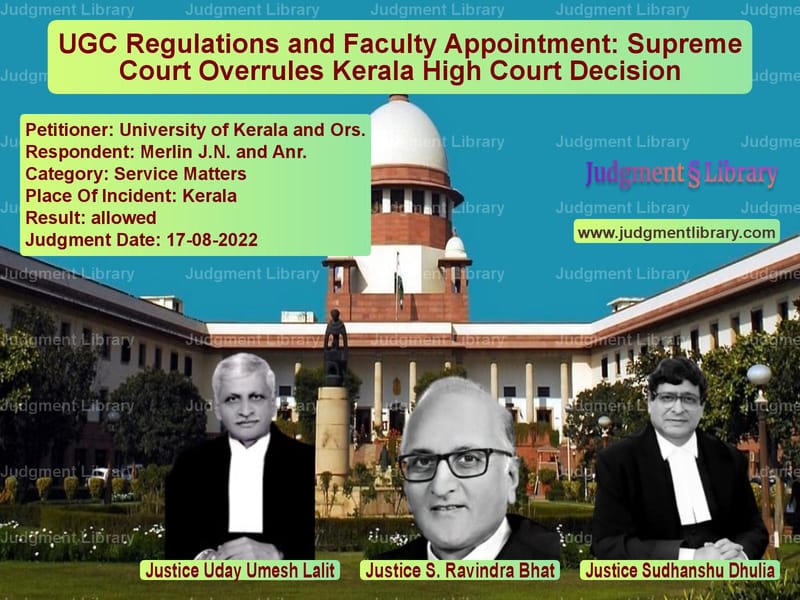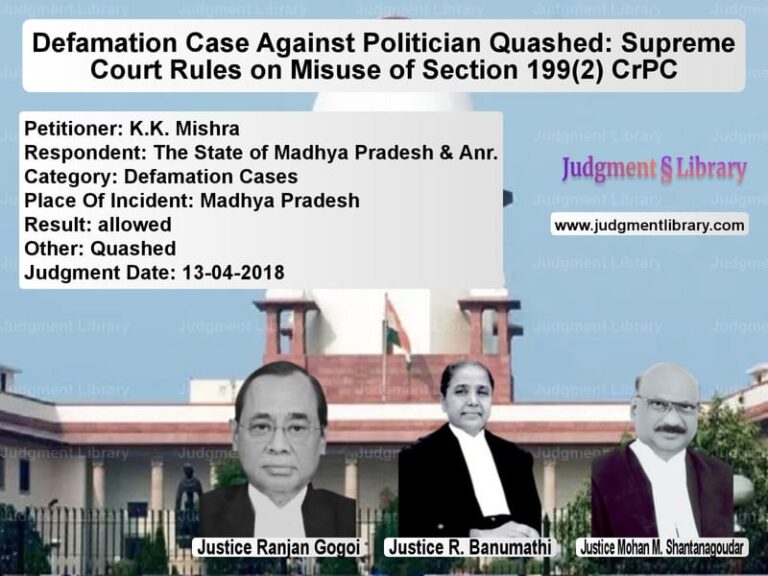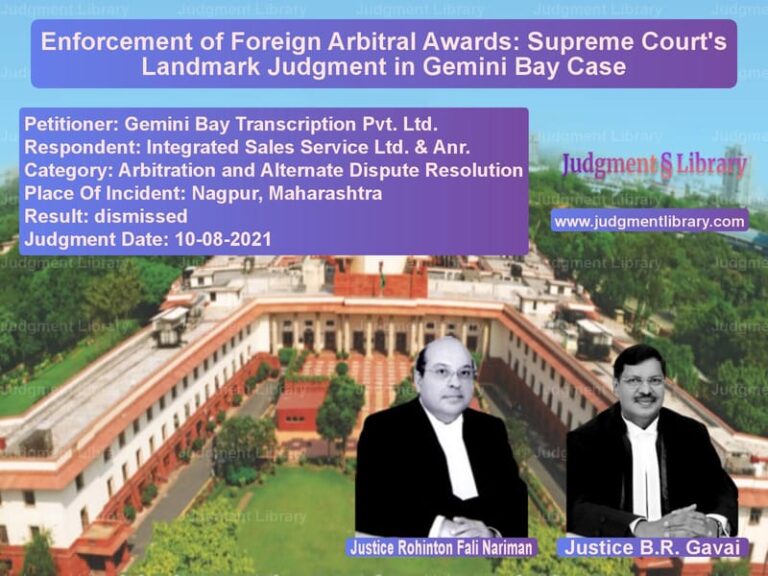UGC Regulations and Faculty Appointment: Supreme Court Overrules Kerala High Court Decision
The case of University of Kerala and Ors. vs. Merlin J.N. and Anr. revolved around the legality of a university faculty appointment and its compliance with University Grants Commission (UGC) regulations. The dispute arose when Dr. M.S. Jayakumar was appointed as a Lecturer in Sociology at the University of Kerala. However, his appointment was challenged on the grounds that he did not fulfill the eligibility criteria under the UGC regulations, particularly the requirement of passing the National Eligibility Test (NET). The Kerala High Court had ruled against the appointment, setting aside Dr. Jayakumar’s selection. The matter was then brought before the Supreme Court, which ultimately overruled the High Court’s decision.
The controversy highlights the evolving nature of academic qualification criteria in India, especially regarding exemptions from the NET requirement for Ph.D. holders. The case also underscores the broader implications for thousands of Ph.D. holders who had obtained their degrees before the implementation of the 2009 UGC Ph.D. regulations.
Background of the Case
Dr. M.S. Jayakumar completed his graduation in Sociology in 1999, acquired his M.Phil. in 2000, and was awarded his Ph.D. on 23.08.2006. The University Grants Commission had, over the years, introduced several amendments to its regulations concerning the eligibility criteria for university faculty positions.
The initial regulations required that all candidates for the position of Lecturer (later termed Assistant Professor) must pass the NET. However, there were exemptions granted to Ph.D. holders, depending on the date of completion and the regulations in force at the time. The amendments in 2009 introduced a stricter framework, stipulating that only those Ph.D. holders who had obtained their degrees in compliance with the 2009 UGC Ph.D. regulations were eligible for exemption from NET.
In 2011, the University of Kerala issued a notification inviting applications for various faculty positions, including Lecturer in Sociology. The advertisement explicitly stated that candidates must fulfill the NET requirement unless they held a Ph.D. in the concerned subject. Dr. Jayakumar applied and was ranked first in the selection process. The second-ranked candidate, Dr. Merlin J.N., challenged his appointment, arguing that he was ineligible under the 2009 regulations.
Legal Arguments
Petitioners’ Arguments
- The University and Dr. Jayakumar contended that his appointment was lawful and in accordance with the existing regulations at the time.
- They pointed out that the 2009/10 UGC Regulations were formally adopted by the University only in 2013, meaning that they should not apply retroactively to Dr. Jayakumar’s case.
- They also cited the minutes of the 471st UGC meeting held on 12.08.2010, which clarified that candidates who had obtained their Ph.D. before 31.12.2009 were exempt from the NET requirement.
Respondents’ Arguments
- Dr. Merlin J.N. argued that the 2009 UGC Ph.D. regulations were already in force when the recruitment took place, and only those Ph.D. holders who had obtained their degrees in compliance with these regulations were eligible for exemption from NET.
- She asserted that Dr. Jayakumar, having obtained his Ph.D. in 2006, did not meet this criterion and was, therefore, ineligible for the post.
- She further stated that she was more qualified since she had cleared the NET in 1998 and had teaching experience as a contractual faculty member since 2001.
Supreme Court’s Analysis and Ruling
The Supreme Court delved into the evolution of the UGC regulations concerning faculty appointments and NET exemptions. The Court examined the successive amendments made to the UGC regulations and noted that prior to 2009, Ph.D. holders were generally exempt from the NET requirement.
Key Observations of the Supreme Court
- The Court noted that the 2009 UGC Ph.D. Regulations were the first to introduce strict academic criteria for Ph.D. degrees, including requirements for coursework, thesis evaluation, and research publication.
- It acknowledged that the regulations effectively divided Ph.D. holders into two categories: those who had obtained their degrees before 2009 and those who had done so afterward.
- The Court referenced the P. Suseela v. University Grants Commission case, which had held that the 2009 regulations should be applied prospectively and that candidates who had earned their Ph.D. before the implementation of these regulations could not claim exemption.
- However, the Court also considered the 2016 and 2018 amendments to the UGC regulations, which sought to rectify this issue by extending exemption eligibility to pre-2009 Ph.D. holders under specific conditions.
The Supreme Court ruled that the 2016 UGC Regulations were intended to have retrospective effect, thereby protecting faculty members who had obtained their Ph.D. before 2009. It emphasized that denying such individuals the exemption would lead to an unreasonable classification and undue hardship.
Read also: https://judgmentlibrary.com/supreme-court-sets-aside-high-court-judgment-in-sbi-disciplinary-case/
Conclusion
In its final verdict, the Supreme Court allowed the appeal and overturned the Kerala High Court’s decision, thereby reinstating Dr. Jayakumar’s appointment. The Court held that the 2016 UGC amendments should be interpreted to apply retrospectively, ensuring that pre-2009 Ph.D. holders were not unfairly disqualified from faculty positions.
This ruling has significant implications for university faculty appointments across India. It reaffirms the principle that regulatory changes should not operate in a manner that disrupts previously settled legal positions, particularly when they concern career and employment opportunities. The decision also underscores the importance of clarity and consistency in the formulation of academic and employment policies.
Petitioner Name: University of Kerala and Ors..Respondent Name: Merlin J.N. and Anr..Judgment By: Justice Uday Umesh Lalit, Justice S. Ravindra Bhat, Justice Sudhanshu Dhulia.Place Of Incident: Kerala.Judgment Date: 17-08-2022.
Don’t miss out on the full details! Download the complete judgment in PDF format below and gain valuable insights instantly!
Download Judgment: university-of-kerala-vs-merlin-j.n.-and-anr.-supreme-court-of-india-judgment-dated-17-08-2022.pdf
Directly Download Judgment: Directly download this Judgment
See all petitions in Employment Disputes
See all petitions in Recruitment Policies
See all petitions in Public Sector Employees
See all petitions in Judgment by Uday Umesh Lalit
See all petitions in Judgment by S Ravindra Bhat
See all petitions in Judgment by Sudhanshu Dhulia
See all petitions in allowed
See all petitions in supreme court of India judgments August 2022
See all petitions in 2022 judgments
See all posts in Service Matters Category
See all allowed petitions in Service Matters Category
See all Dismissed petitions in Service Matters Category
See all partially allowed petitions in Service Matters Category







